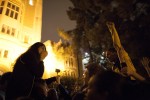There are more than 700 groups registered on OrgSync, an online portal that UCLA uses to keep track of student organizations.
That’s a sizable figure – about one group for every 30 undergraduate students – representing a remarkably diverse range of interests and activities. Yet for all that diversity – health groups, cultural groups, outdoor groups, charity groups – only a narrow range of organizations come into contact with the student government in Kerckhoff Hall.
For example, only 70 groups benefited from the $25,000 allocated from the Student Organization Operational Fund last quarter.
The other 600 or so groups, for some reason or another, aren’t applying for or receiving funds – and that’s a problem for a student government whose purpose is to promote campus unity. Of course, this relationship goes both ways, and student groups should seek out USAC as a resource.
However, as USAC is specifically chartered to support student groups, the council should actively seek out a wider variety of student groups to work with.
Moreover, USAC should forge a relationship with student groups that goes beyond funding. Aside from its allocation funds, USAC’s greatest resource is its people – teams of dedicated interns and staff that should be working more effectively to promote and support UCLA’s vast range of student organizations.
Taylor Bazley, the co-chairman of True Bruin, a new slate running in the upcoming USAC elections, said he feels the council largely overlooks groups which do not participate in student government politics.
For anyone familiar with USAC campaigning, the allegation makes sense. Typically, a coalition of Greek organizations and Jewish groups support the Bruins United slate, while other cultural groups fall in line with the Students First! slate, which failed to run candidates this past election.
Other than those organizations that actively mobilize votes for either slate, most groups have little contact with student government, Bazley said.
If Bazley is correct, he has identified a serious flaw in our student government. But even if he’s wrong, the call for more connectedness between USAC and the student body should be addressed.
An oversight of the council is not neccessarily to blame for the fact that many groups fail to attract a significant amount of attention. Many student groups feel that USAC has little to offer them.
Anjali Mehta, vice president of the Undergraduate Mathematics Students Association and a third-year applied math student, said that her club has not applied for USAC funding in the past two years because it hasn’t felt the need to do so. She added that the group is supported in part by member fees and the math department.
USAC may indeed have little to offer Mehta’s organization; however, their responsibility is to identify ways that they can be of use to clubs like hers.
For her part, Community Service Commissioner Anees Hasnain, a fourth-year sociology student, has made it a point to bring student group engagement onto the council’s radar.
When the council discussed funneling $100,000 into an endowment fund at the end of last year, Hasnain suggested that the council survey student groups before such a large sum of money be used. Reaching out to student organizations helps keep the council’s interests aligned with that of the larger student body, Hasnain said.
Hasnain is pushing to convene a panel of councilmembers called the Student Group Outreach Committee, a body that seeks to strengthen the link between USAC and the campus at large.
While this effort is worthwhile, student group engagement should go beyond any particular committee or office. Limiting the discussion of outreach to a single committee may in fact be counterproductive.
Indeed, the USAC Internal Vice President’s office currently seeks to forge personal connections with campus groups through a team of student organization liasions. However, that initiative should transcend the IVP office and instead be part of USAC’s guiding principles.
It is unclear that Bazley’s new slate, or any other slate for that matter, can accomplish this goal. More likely, it will require the tireless effort on the part of many successive councils.
Email Arom at darom@media.ucla.edu or tweet him @eitan_arom.
Send general comments to opinion@media.ucla.edu or tweet us @DBOpinion.

Eitan get your facts straight and know when a council member is lying. Anees Hasnain did not propose polling the student body on how to spend student fees. That was Kim Davis, she gave a presentation on it. Give credit where credit is due. Apparently I read the Daily Bruin more often than you do.
“USAC may indeed have little to offer Mehta’s organization; however, their responsibility is to identify ways that they can be of use to clubs like hers.”
“Anjali Mehta, vice president of the Undergraduate Mathematics Students Association and a third-year applied math student, said that her club has not applied for USAC funding in the past two years because it hasn’t felt the need to do so. She added that the group is supported in part by member fees and the math department.”
Seems to me that groups ran by students like Anjali are an example of efficient spending and funding. Requiring USAC to throw money at student groups for no reason is inefficient and reckless spending. No where is there a responsibility to fund these groups which do not apply for funding. An issue would arise if Anjali did indeed apply for funding but was rejected by USAC for x reasons.
What you are saying makes no economic sense. Throwing money at things does not solve imaginary problems that you claim to exist.